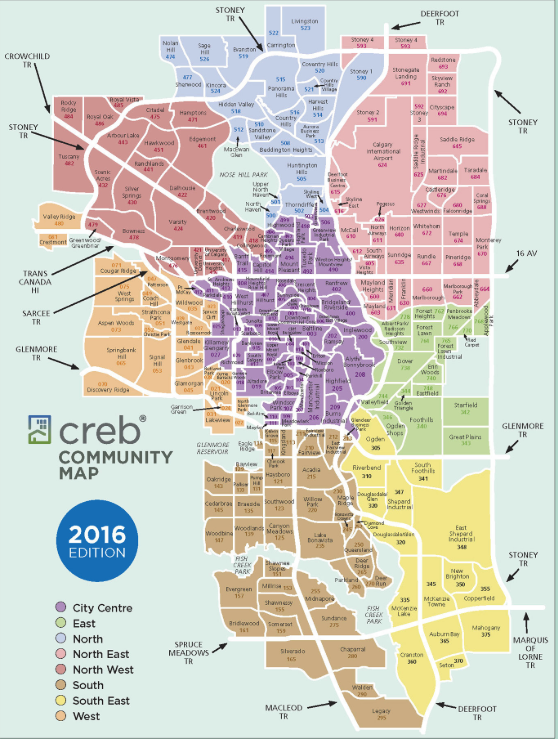Calgary: City Planners Rethinking Community Plans
For decades, one of the key planning tools for community development in Calgary was the “Area Redevelopment Plan (ARP).” However, with the increasing number of communities (now over 200), the task to create new plans and update old ones has become formitable.
So, the City of Calgary is experimenting with the idea of creating 40 or so “community districts,” each with their own strategic growth plans that incorporates the needs and aspirations of several neighbouring communities in a synergistic manner.
That’s the hope anyway….
Does Calgary have too many communities?
Is this a good idea?
Jane Jacobs thinks so. In her 1960s book “The Death and Life of Great American Cities” (which has become the bible for North American urban planning in the 21stcentury), she says “cities have too many communities - and that it leads to small town, inward thinking.” In her opinion, communities should be larger, about 50,000+ people, to allow for more diversity in perspectives and attitudes.
At this scale, she feels a community will have sufficient votes to capture the politician’s attention and allow for more comprehensive planning rather than being fragmented into small neighbourhood plans.
The Green Line is going to shape the redevelopment of Calgary for the next 50 years. It is going to be the catalyst for major changes in dozens of communities.
North Hill Communities
The City of Calgary’s first larger “community district” will be called North Hill.
It will encompass Highland Park, Mount Pleasant, Tuxedo Park, Winston Heights-Mountainview, Crescent Heights, Renfrew, Captiol Hill and Thorncliffe Greenview (south of Mcknight Blvd).
These communities are all experiencing significant growing pains.
Infill housing developments of all shapes and sizes, as well as several major developments on the horizon - Highland Golf Course redevelopment, Green Line LRT and the 16thAvenue BRT will all dramatically reshape urban living in these communities.
Edmonton Trail has huge potential to become a vibrant pedestrian street.
Did you know that 4th St NW is the site of Calgary’s first McDonald’s?
North Mount Pleasant Arts Centre is a hidden gem.
In the future Centre Street will (could) become a vibrant pedestrian street with an LRT station near this intersection.
Centre Street as it passes through Highland Park with the Bow Tower in the background is ripe for redevelopment.
Is Bigger Better?
At this early stage the City will be hosting community meetings to gather ideas, issues and opportunities. It has a website https://engage.calgary.ca/NorthHill that allows everyone not just residents to ask questions and learn more about the plans for a North Hill Community Growth Plan.
In the past the City, would have had to manage eight separate area redevelopment plans for communities ranging in size from 3,337 to 8,849 residents. The new “bigger is better” thinking model will develop one plan for 45,760 people.
Ironically this size fits with Jacobs’ belief.
This is not the first time the City has developed growth plans that combined several neighbouring communities. Back in 2007, the City developed the Center City Plan which included Eau Claire, Chinatown, East Village, Downtown Core, Downtown West and the Beltline, recognizing that collectively, these urban mixed-use, high-rise communities shared a lot in common.
Today, they have a combined population of 43,492, again near Jacob’s benchmark.
But wait there is more.
Traditionally, Calgary’s communities have been established based on how developers and the City subdivided the land and built new homes.
However, the northwest community association of Northern Hills (not to be confused with North Hill) which includes Harvest Hills, Coventry Hills, Country Hills Estates, Panorama Hills Estates, Country Hills and Panorama Hills were all built in the ‘90s.
All of these communities surround the regional VIVO (formerly Cardel Place) recreation and wellness centre which has become the heart, soul and gathering place for all six communities.
It should be noted that the formation of the Northern Hills Community Association was led by the community, not by city planners or politicians.
And it has a population of about 60,000 people.
VIVO is a busy place….
Last Word
The City of Calgary has moved to a more regional and integrated model for amenities like recreation and library facilities in the 1980s and developers have also moved to more regional shopping and entertainment centers since then.
The concept of small independent communities (5,000 to 10,000 people) needs to evolve as urban living changes from being more local to more regionally based.
VIVO and Calgary’s other mega recreation/leisure/library/wellness centres with their associated parks, playgrounds and playing fields have become the modern equivalent of the town squares of European cities built hundreds of years ago.
City building is a continuous series of adaptations and the City of Calgary, developers and communities are obviously adapting to Calgary’s as it grows towards two million people and over 200 communities.
Note: An edited version of this blog was published in the December issue of Condo Living magazine.
If you like this blog you will like these links:
Does Calgary have too many neighbourhoods?
Mount Pleasant: Calgary’s Other 4th Street
Calgary’s Highland Park Deserves Better











